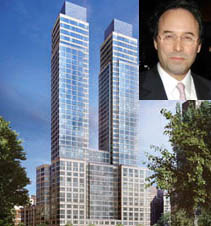
Rushmore and Extell’s Gary BarnettLawyers for Extell Development and Carlyle Realty Partners, which operate together as CRP/ Extell, admitted to the state attorney general that they had no evidence to back up claims that a typographical error led to a $16 million escrow dispute at the Rushmore condominium, according to new documents filed in New York State Supreme Court.
Attorney General Eric Schneiderman filed the evidence in response to an October 2010 suit by CRP/Extell that claimed the previous AG, Andrew Cuomo, erred in his April 2010 decision to order the Rushmore developer to refund deposits to 41individual buyers at the condo, at 80 Riverside Boulevard.
The Rushmore dispute centers on whether the developer was required to hold the first closing on an apartment by Sept. 1, 2008. The developers claim that a single-digit typo in the condo offering plan should have stated Sept. 1, 2009, and that the 41 buyers just asked for rescission because of the 2008 economic collapse.
After losing several rounds in federal court, the developer filed suit against Cuomo in October 2010, alleging the AG’s office failed to provide an opportunity to depose the buyers and raise questions about the buyers’ motivations. Schneiderman’s office, in newly filed papers Feb. 15 counters that
CRP/Extell lawyers never raised a single complaint about the procedure
until after the AG order was released.
“Petitioners’ efforts must fail, as the allegations within the petition reveal that petitioner is simply unhappy with the results of the attorney general’s review process,” according to papers submitted by assistant AG Andrew Meier. “The process was not unfair and the results reached were entirely correct.”
The AG also noted that CRP/Extell never once asked to take “discovery” or complained about the methods used by the AG during the investigation.
Legal experts say the newly filed papers seriously contradict the CRP/Extell argument that they didn’t get a fair hearing, because when they were offered a chance to back up their claims, they provided no evidence to back them up.
“The AG is saying, we gave you all kinds of chances,” said Andrew Weltchek, a Manhattan-based lawyer who has represented numerous developers and condo buyers in escrow disputes, but is not involved in the Rushmore case. “Far from acting arbitrarily, we bent over backwards to let you explain to us what was going on, and you didn’t have anything.”
Included in the evidence by the AG, was an April 2010 e-mail by Douglas Kantor, a Washington-based partner at the law firm of Steptoe & Johnson, to three officials, including assistant AG Susan Scharbach, that lawyers for the developer they had no written proof to back up a claim that the first closing was due to such an error.
“One quick thing to note upon reflecting on our conversation yesterday is you asked if we have such a document that contradicted the Sept. 1, 2008 rescission date,” Kantor wrote in the April 8 e-mail. “As we mentioned, we do not have such a document other than the agreement itself which must be read as a whole.”
The following day, Cuomo ordered CRP/ Extell to refund the deposits of 41 buyers at the luxury condo, and despite numerous attempts to reverse the order in federal court, the developers were repeatedly denied and are now fighting the rescission order in state court under a so-called Article 78 proceeding.
Lawyers for the buyers argue that the new evidence raises questions about whether the developer can continue pursuing the same legal arguments.
“We find the AG’s statements very revealing,” said attorney Richard Cohen, who represents 33 of the buyers. “It is certainly time that the sponsor return the purchasers’ down payments.”
Officials at Extell said they would submit to the court a formal response to the AG allegations.
Extell, in an e-mailed statement, said it was not required to submit a response until March 1. “We will respond to issues raised in the attorney general’s submissions at that time,” the company said.
Carlyle Realty Partners declined to comment.